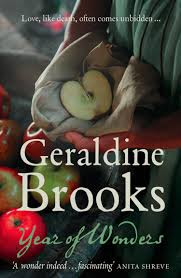
This book is based on the true story of a tiny Derbyshire village that was stricken with the plague. Rather than flee, the villagers decided to quarantine themselves, to avoid infecting neighbouring communities. They succeeded in saving their neighbours, but about two-thirds of the village died. In short, it’s kind of an apocalypse novel. And I love a good apocalypse novel. It’s chock full of terrible moral questions, which is of course the best part of the apocalypse (at least in fiction. In real life, the best bit will be still being alive).
Early on the villagers make the brilliant plan of killing the only people in the village with any kind of medical knowledge – the female herabists (aka, witches). You then begin to feel really grateful for modern medicine, as the villagers try and cure themselves by randomly eating various bits of leaves and bushes in the hopes that something will work. Big props to the Enlightenment, you guys. And big props also to Fleming, for the invention of antibiotics, which is still the only cure for the plague.
I enjoyed this book very much. However I struggled as I did with Brooks’ MARCH that it works more as an interesting collation of research than exactly as a novel. There’s a also a bit of challenge in how contemporary the characters feel. They are all busy enjoying roses and whatever, but I am quite sure that in reality the inner life of people of the seventeenth century was more along the lines of “it mislikes me not when the devil does be upon the bacon” or whatever: inscrutable historical weirdness.
